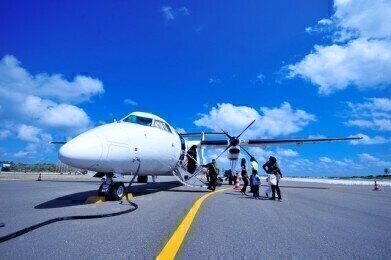Fuel for Thought
How is Jet Oil Analysed?
Jul 27 2022
From maximising fuel efficiency and reducing operational costs to assuring the safety of passengers and crew, jet oil analysis is critical to the aviation industry. Scientists rely on a myriad of techniques and instruments to analyse jet fuel and assess different parameters. These include:
- Gas Chromatography (GC) combined with Mass Spectrometry (MS) to identify and quantify individual hydrocarbons.
- Flash point testing for volatility and flammability analysis.
- Conductivity meters to measure how fast an electric charge passes through a sample.
- Differential Scanning Calorimeters (DSC) to test the thermal stability of jet oil.
- Copper strip corrosion test kits to assess corrosiveness.
- Electromechanical Separometers to analyse water separation characteristics.
Jet A vs Jet A-1
Within the industry, the ASTM D1655-21c Standard Specification for Aviation Turbine Fuels is acknowledged as a gold-standard test to determine whether fuel is classified as Jet A or Jet A-1. The main difference is freezing point, with Jet A-1 offering a lower maximum freezing point than Jet A. This makes Jet A-1 fuel better suiter to long haul flights that reach high altitudes and travel through polar regions.
The ASTM abstract reads:
“The fuels shall be sampled and tested appropriately to examine their conformance to detailed requirements as to composition, volatility, fluidity, combustion, corrosion, thermal stability, contaminants, and additives.”
A new era of sustainable aviation fuel
Sustainable Aviation Fuel (SAF) is reimagining how planes take to the skies. Produced using sustainable feedstocks, the biofuels have a similar chemistry to conventional jet oils derived from fossil fuels, without the mammoth environmental footprint.
American Airlines is a pioneer of the SAF movement. The company recently announced plans to purchase 500 million gallons of SAF from Gevo, a Colorado-based biofuels company. The fuel will be delivered over the next five years and will help American Airlines reach its ambitious decarbonisation targets and climate goals.
“Today’s announcement is a historic step forward for American and our industry as we work to reduce our carbon footprint,” says Jill Blickstein, Vice President of Sustainability at American Airlines. “The use of SAF is a cornerstone of our strategy to decarbonise air travel. While this landmark investment represents meaningful action by American Airlines, driving progress at the scale and pace we need requires critical policy action in Washington and at the State level. Alongside our oneworld partners, we’re proud to lead the way in the shift to SAF and make progress toward our shared climate goals.”
American Airlines isn’t the only company embracing SAF, with Virgin Atlantic also hitting exciting decarbonisation milestones. Find out more about the airline’s partnership with a Finnish oil refining company and global petroleum giant in ‘Virgin Atlantic agrees sustainable aviation fuel supply with Neste and Exxonmobil’.
Or if you want to know more about the SAF movement, Dr. Raj Shah, an expert at Koehler Instrument Company, spotlights the latest innovations in ‘Recent Advances in the Sustainable Aviation Industry’.
Digital Edition
PIN 25.3 June/July
June 2024
Analytical Instrumentation - Recent Advances In Various Bench Scale Accelerated Oxidative Testing Methods For Fuels - Petrochemical Industry: Anton Paar Solutions Streamline Processes, Reduce H...
View all digital editions
Events
Jul 30 2024 Jakarta, Indonesia
Jul 30 2024 Jakarta, Indonesia
China Energy Summit & Exhibition
Jul 31 2024 Beijing, China
Jul 31 2024 Chengdu, China
Aug 05 2024 Moon Township, PA, USA


















